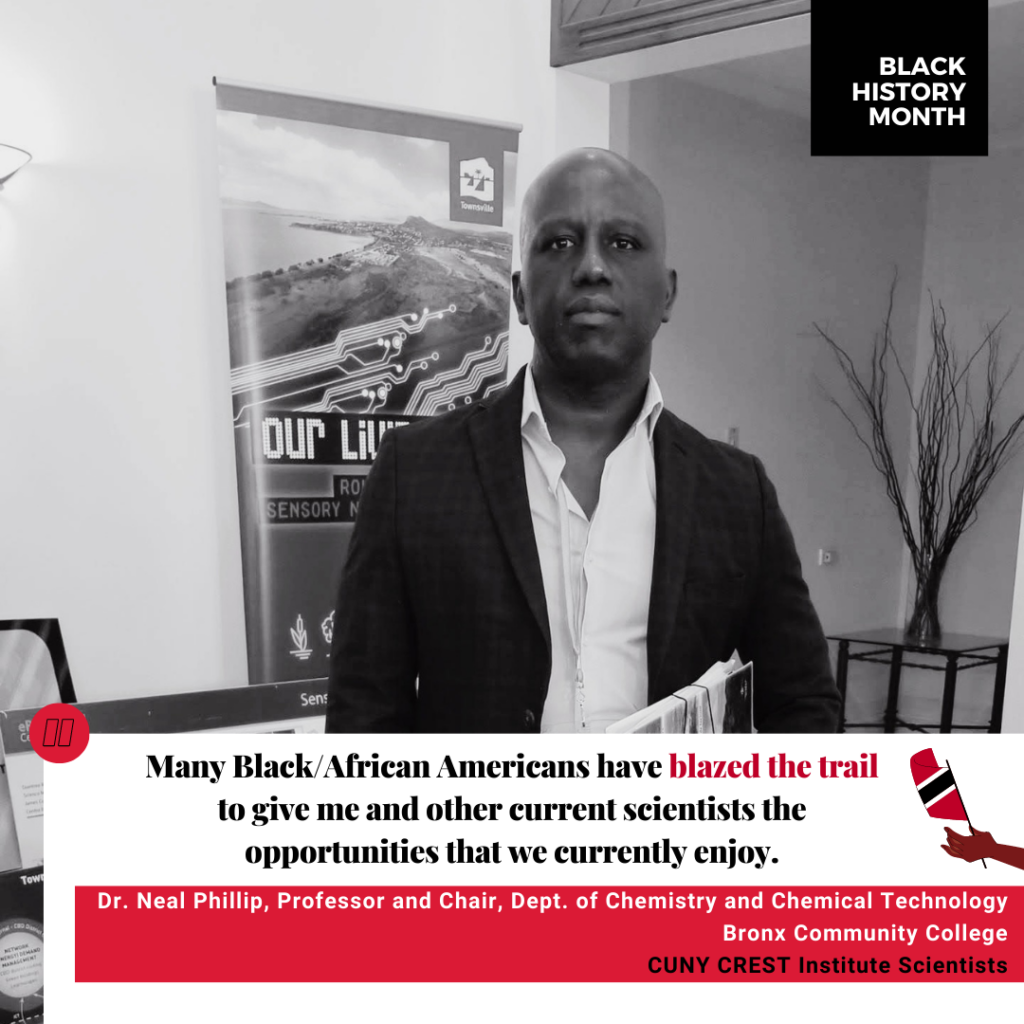Black History Month: Dr. Neal Phillip
Interviewing Dr. Neal Phillip
Dr. Neal Phillip is Professor and Chairperson of the Department of Chemistry, Earth Sciences, and Environmental Sciences at Bronx Community College (BCC). Dr. Phillip has previously installed solar powered weathered stations in India, Australia, Spain, with CUNY students, in Trinidad and Tobago, and on Governors Island at the New York Harbor High School.
How has your identity as a Black/African American scientist influenced your profession?
I try not to put much emphasis on racial identity in my professional career but I am also cognizant of the fact that many Black/African Americans have blazed the trail to give me and other current scientists the opportunities that we currently enjoy. I think of people like the late Dr. Roscoe Brown, one of the famed Tuskegee Airmen who was also a past President of Bronx Community College. It was believed that African American could not fly and Dr. Brown and the other Tuskegee Airmen in the 332 Fighter Group showed the world that African Americans could not only fly but could be the best fighter pilots and under the most grueling circumstances during the WWII. I met Dr. Brown on several occasions when he visited the college for special events. I am also inspired by family members such as my cousin Marleen Phillips who went from Bronx Community College/CUNY to York College/CUNY and then to Law School to eventually enjoy a lengthy career as a lawyer for NASA, even serving before she retired as the Interim Chief Legal Counsel at NASA Stennis Space Center. Marleen’s sister Wendy is now a Judge in Albany, New York and her sister is a Federal Judge in North Carolina.
What obstacles have you faced in your profession as a Black/African American scientist? How did you overcome them?
The obstacles I faced thankfully have not been related to race which shows the promise of America. I emigrated from Trinidad and Tobago in the Caribbean to the United States in the late 1980s so the obstacles I faced was typical of any new immigrant coming to the United States and to a big city like New York City from a small country. Having a strong support network of my mother, father, brothers and sisters and aunts, uncles and cousins in the United States and back in Trinidad and Tobago was extremely helpful to my success. In my first semester at City College, I failed Calculus I which was extremely disappointing. Instead of blaming the professor or anyone else I blamed myself for not studying adequately and for not being confident enough in my abilities. Many members of my family are/were teachers, and principals and my uncle Dr. Clyde Phillip founded Success College in the Bahamas, so needless to say, failure was not an option. I rebounded and passed Calculus I and went on to earn dual Bachelors in Chemistry, Meteorology and Masters and Ph.D. degrees in Environmental Engineering. All of these degrees required many Math courses beyond Calculus I and Mathematics even became my favorite subject along the way.
What does Black History Month mean to you?
Black History Month is a celebration of the overcoming of the struggles that Blacks have endured in the United States for centuries. Blacks now occupy some of the most prominent positions and roles in STEM and in government that our forefathers would not have imagined in their wildest dreams when they came to the United States under much different circumstances. It is always a pleasure to participate in the Annual Black Engineer of the Year Award (BEYA) STEM Conference in Washington, DC during February with fifty of our STEM majors to see the great achievements and strides made and to see the world of opportunities that have been created for us.
What has been your biggest inspiration?
I have always been inspired by my mother Ruby Phillip, my late father Kelvin Phillip, my late grandfather Denzil Haynes, my late grandmothers Constance Haynes and Agnes Morris who all have shown so much compassion and love. My uncles Ulric Buggy Haynes, Aunt Mavis Bailey, Audrey Haynes, Wilma Phillips, Oswald Haynes have always believed in me and never stopped pushing me to succeed to carry on the family name with pride and always with the utmost amount of integrity. Others in the United States, Dr. John Fillos and the late Dean Gerald Lowen both of City College/CUNY always believed in my abilities and encouraged me and have inspired me to give back equally to my students.
You are a role model for many of our students. What advice would you give Black/ African American youth interested in Earth Systems science?
I strongly encourage Black/African American youth to take advantage of the numerous opportunities that are presenting themselves as the changing demographics in the United States requires the hiring of scientists/engineers of color to diversify the workforce to make America equitable and competitive in the world. There are numerous internship and scholarship opportunities available currently in the STEM areas. Never say no for these opportunities because they may not present themselves at another time in your lifetime. I also strongly encourage them to seek out mentors who could provide professional/life guidance like I have been honored to have in my life in Trinidad and Tobago and the United States.
The CUNY CREST Institute gives thanks to Dr. Neal Phillip and our other amazing scientists participating in our interview! We are proud and honored to have you as part of our team, for not only your great work and success but also to serve as a role model and leader to students, partners, stakeholders, and other communities we serve at the CUNY CREST Institute.

